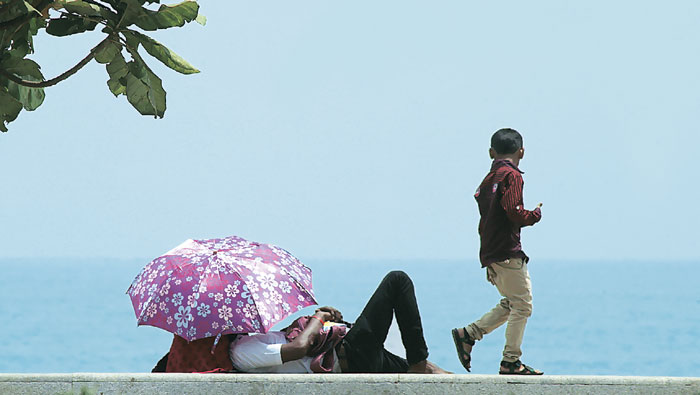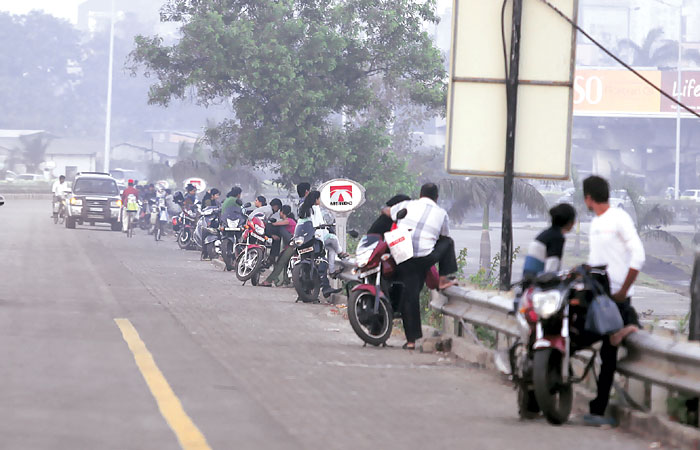 With a population density of over 27,000 per square kilometre, the privacy of four walls in Mumbai is considered a luxury for most couples, married or unmarried. To many, the milling crowds in the city are both an intrusion and a refuge (Illustration: CR Sasikumar)
With a population density of over 27,000 per square kilometre, the privacy of four walls in Mumbai is considered a luxury for most couples, married or unmarried. To many, the milling crowds in the city are both an intrusion and a refuge (Illustration: CR Sasikumar)
In a tiny pocket of her purse, Noorie Patel carries two old tickets of Dhoom 3. Even though the film released in December 2013, she cannot get herself to part with them. “My husband teases me about it,” says the 23-year-old, cradling her one-year-old daughter in her arms. Noorie became the seventh member of a joint family when she married Manek Patel three years ago. To the newly-wed couple, the one-bedroom apartment on Charni Road, south Mumbai, felt overcrowded, especially since theirs was an arranged match and they had only known one another for two months. They would go out to watch movies, shop and talk endlessly on long walks but the nights were not theirs to claim: they shared the bedroom with Manek’s elder brother, his wife and child.
Following an especially long dry spell without physical intimacy, Manek realised he had to do something. The year’s big Christmas release, Dhoom 3, was playing in the theatres. It featured his mother and brother’s favourite actor, Katrina Kaif. He purchased tickets for the entire family but backed out of the plan at the last moment along with Noorie. Nine months later, their daughter Katrina was born. “The two tickets are those we never used,” says Noorie, blushing.
Seated on the promenade with their footwear by their side, Noorie and Manek have made an out-of-the blue visit to Marine Drive today, “just for a chat”. After the incessant rain of two days, the promenade, lit up under the stark glow of white street lamps, is busier than usual on a weekday. The sun has set and a cool monsoon breeze, carrying a hint of drizzle, blows inwards from the sea. Visibly irritated by the constant need to navigate the crowd of joggers, dog walkers or families on a leisurely stroll, a woman, who appears to be in her 50s, alights the parapet. She is geared for an evening walk too. Sports shoes paired with a salwar kameez, and a dupatta tied across her torso, she marches on without a pause, walking between the visitors and smooching couples who line either sides of the parapet. She is unmindful even as she steps on a dupatta, the strap of a bag and Namita’s little finger. Letting go of Francis whom she was kissing until a moment ago, Namita yelps in pain, but the lady has walked on. Pressing her finger, she looks at Francis in a mix of anger and hurt, but soon, the two are laughing.
 Band Stand (Source: Vasant Prabhu)
Band Stand (Source: Vasant Prabhu)
With a population density of over 27,000 per square kilometre, the privacy of four walls in Mumbai is considered a luxury for most couples, married or unmarried. To many, like Namita and Francis, the milling crowds in the city are both an intrusion and a refuge. A resident of Naigaon, a northern suburb of Mumbai, Namita has been dating Francis for two months. Colleagues at a retail outlet in Colaba, the 23-year-olds find the Marine Drive promenade ideal to spend time together. “We come here after work, before I take the train home from Churchgate station,” says Namita. Francis finds the spot “safe” to hang out. “Throughout the day, couples sit here facing the sea; they talk, even get a little intimate. But no one bothers you. Sometimes, couples sit here till late into the night,” says the Colaba resident.
While lovers in need of space to chat or a bit of a nookie take comfort in anonymity, those seeking intimacy are starved for spaces. The limited “safe” options further diminished earlier this month, when Mumbai police knocked on hotel rooms in Mumbai’s Malvani area as part of a raid after an anonymous tip-off regarding sex trafficking. They booked 13 couples under Section 110 of Bombay Police Act for “indecent behaviour in public”. They were fined Rs 1,200 each and taken to the Malvani police station, “humiliated” and asked to prove if they were married.
“There was a knock on my door at 4 pm by the hotel staff. The staffer had asked us to come down with our ID cards. My partner and I were taken aback but we cooperated. Once we went down to the lobby, they (police) made us stand in one single file and checked our IDs. After that, we were ferried in a van to the Malvani police station. There were close to a 100 people in a large hall inside the police station. Unhone hume bahut zaleel kiya hain (They really humiliated us),” said a 37-year-old Kandivali resident who was booked by the police on August 6.
Perhaps the most striking thing about Mantara Residency, one of the hotels raided in Malvani, is the intense quiet around. Located on a lonely stretch of the Aksa beach, one can hear the sound of crickets and the lashing waves on the beach.
On any regular day, says owner Harish Shetty, a range of vehicles, from Audis to sedans and even bikes would be parked in the lot. But now, it lies vacant.
 Couples at Marine Drive
Couples at Marine Drive
Shetty says his business took a hit a few years ago when the police introduced a rule, stating a room cannot be rented out unless guests produced identification and address proof. He adds that on the day of the raid, if the police had a tip-off that some of the guests were into sex trafficking, the ID cards furnished by them should have been double-checked before they were hauled out of the rooms. “But they flouted the procedure. The raid has seriously hurt our business and also of other hotels across the city,” Shetty says.
As outrage grew over what seemed like an act of moral policing, the Mumbai police ordered a probe into the raid and if it had followed “due procedure”. Shilpa Phadke, a professor at School of Media and Cultural Studies, Tata Institute of Social Sciences, who closely studies women’s access to public spaces in the city, says police action on “indecent couples” often involves victim shaming. Several women she interviewed while researching the book Why Loiter? with co-authors Sameera Khan and Shilpa Ranade, spoke of instances of harassment. “If discovered by a cop at the rocks sharing a private moment with their lover, the women are warned with visions of violence. Over the last two years, they have started to cite the Delhi rape case as an example,” says Phadke, who also came across instances where corrupt officials threatened to call the girls’ parents and demanded up to Rs 7,000 to stay mum.
S peaking on the raid, Delhi-based lawyer Saurav Datta says the police have few checks on their powers. “They search every nook and cranny for illegal prostitution, which will entail hounding out every consenting couple from behind closed doors and place the onus on the woman to prove that she wasn’t selling sex for money. If they cannot get a haul which is big enough, they invoke Section 110 just to pocket fines and notch up arrest rates,” he says. The real potential for misuse is Section 110 of the Bombay Police Act, which arms the police with untrammelled power to decide what is “indecency” in a public place. “‘Indecent conduct’ is subject to whims and caprices of the police force, who come with their own baggage of what is moral, immoral or indecent. It shouldn’t be the law at all,” he says.
 Band Stand
Band Stand
While custodians of decency blame an invasion of Western values for more permissive relations between the sexes, author Kiran Nagarkar recalls that the righteous, disapproving cop was as active in the 1950s as he is now. He recounts a time when he sat outside a temple with a young lady he liked and a havaldar showed up. “Those were different times, when boys and girls hardly spoke to one another. We were seated two feet apart, if not more. And the havaldar started telling us he knew what we were up to. Although we were innocent, we soon grew nervous as she hadn’t informed her parents of her whereabouts. I was asked to cough up Rs 350, a big amount at the time,” says Nagarkar, who mentions the incident in his first Marathi novel, Saat Sakkam Trechalis (Sevens Sixes are Forty-Three).
Love is a hard game to play and the plight of young couples is well chronicled in local literature. It is, perhaps, one of the biggest levellers of Mumbai life. Late Dalit Marathi writer Daya Pawar, in his landmark autobiography Baluta, for instance, speaks of a tacit understanding between neighbours in his chawl in Kawakhana. With multiple families living in one room, privacy was a gift of kindness from neighbours. Pawar recounts how, for a man’s “honeymoon night” with his mistress, the women from the chawl emptied out a store room. About his own self, he says, “No one seems to have noticed we’ve just got married, we have no privacy, no place to sleep marked off for us.” Later, describing the sleeping arrangement — his wife and he slept below his aunt’s cot — Pawar says: “Once, we switched off the light and waited. But how long can you wait? Kaku walked in suddenly and put on the light. Chaos ensued. We had a difficult time trying to cover up our naked bodies with the sheets.”
So how does Mumbai love?
Nagarkar’s latest work, Rest in Peace, the final instalment of the famous Ravan and Eddie trilogy, chronicles the protagonists’ desperate quest for privacy. Lauding the zeal of lovers who sit by the sea even during the harshest of weather, he writes: “If you could take the day off work, there was the stretch from Nariman Point to the Mafatlal Swimming Pool where you could sit on the parapet next to the sea from 11am to 4.59 pm or, if you were venturesome, step out on to the concrete tetrapods and let the sun turn you to toast and then char you to black carbon.”
But 33-year-old Aditi Kolhe (name changed), who has more than once borne the brunt of the sun to steal a few intimate moments with her lovers over the years, believes relentless heat isn’t the worst of the problems a couple faces. “One big step to getting to know someone while romancing on the Marine Drive promenade, is figuring out who sits to the left (or right), as you master the sideways kiss and also the looking-away-blushing part of the act,” says the Santa Cruz resident with a laugh. She will have you know that there are few things more romantic than kissing inside a rattling cab as it winds its way around Marine Drive. And then there are the gawkers, often a group of stags, who strategically seat themselves close to smooching couples to derive vicarious pleasure.
It is to counter two of the three problems listed above that HR professional Carol Mascarenhas has invested in a burqa. With both her office and her residence in Bandra, she doesn’t get the opportunity to be whisked away by her boyfriend to a garden or a beach in a distant neighbourhood. “Initially, I borrowed one from my Muslim friend upon her suggestion. But I realise the long-term benefits now,” says the 25-year-old who has a “designated spot” on the rocks off Carter Road promenade.
But 44-year-old Ramnath Ishwar Kale, having worked at various cinema halls in the city in different capacities for nearly 15 years, is sure that all the city’s couples “in need for action” go for the morning shows. “They shamelessly indulge in… I cannot even talk about it,” says Kale, who believes sex before marriage is sin and those indulging in public displays of affection should be legally persecuted. “Why can’t they just go to a hotel?”
But if the moral police can enter hotel rooms, what avenues for privacy remain for couples? Phadke believes the answer lies with parents. In an open letter she wrote to the parents of the girl who confessed to her desire to commit suicide after being shamed during the raid, the sociologist points out that one way to undermine the power of the moral police was to change the attitude towards the sexual autonomy of young people. “There will be times when we (the parents and the child) will violently disagree. My task, as I see it, as a parent, is to convince my daughter unequivocally that no matter how much we disagree, I am in her corner and will support her even when I do not agree with her,” she writes. That would minimise the possibility of blackmail of unmarried men and women.
As for the married, perhaps, Noorie and Manek set an example. The family film viewing is now a bi-monthly ritual. Sometimes, the couple use the four-hour reprieve to just talk, argue even. Today, they have decided to take their fight to Marine Drive. They sit staring into the sea after having vented their anger while the baby plays with Manek, who owns a shop in the wholesale paper market near Chira Bazaar/ Crawford Market. “With the baby now, I cannot afford to rent a house. But where I live is too crowded even for an argument.”











